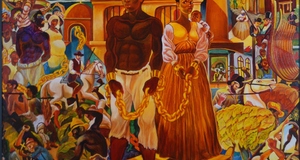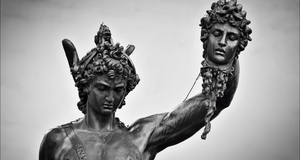|
The Development of the Printing Press and the Decline of the Chronicle as Historical Method
While in medieval times the chronicle was the method by which people would hear and read of the most recent news, it was now too long and bulky to compete with the various cheaply printed genres in the print shop. In addition, it could not keep up with the speed with which the other genres could communicate news. By the time a chronicle recorded a contemporary event, passed through the press, and reached the bookseller, it was no longer news. Manuscript newsletters, ballads, and newsbooks could record and communicate events at a much greater speed than could chronicles. With the limitation of the chronicles to the most recent past, and the most recent past being disseminated by other genres, the chronicle’s purpose was becoming obsolete.
While print shops stopped printing chronicles as they moved in the direction of smaller and cheaper, there were a few exceptions. Printers were afraid to lay out the cost of printing such bulky books, but if the expenses could be offset by the government or by a wealthy patron, printers were occasionally open to printing chronicles. Other times, printers were willing to take the risk, and the chronicles became bestsellers, such as Holinshed’s Chronicles of England, Scotland and Ireland. Even with the defrayed cost, printers were unlikely to continue to print reissues or new editions, as the venture was too risky. Since the financial elements of the printing press led to the dissemination of the functions of the chronicle, accessible historical topics were expanded.
As the territory of ‘recent history’ was overtaken by news sources, historians found the world of history more open. They were no longer confined to the recent past; rather they pulled sources together in a historical discovery of the remote past. Coupled with the access to public archives that allowed historians to delve further into the past, this rediscovery of the distant past became their main occupation. The printing press’ destruction of the chronicle moved historians to no longer add records of the recent past onto traditional accounts of the distant past, but to expand their scope to the beginning of time.
In both an underlying and direct way, the printing press played a major role in the historiographical changes that came about at the end of the sixteenth century. Renaissance historians could only begin to record events as centered around human action because of the access that the printing press provided to classical texts that espoused this idea. Historians began to develop a scientific and systematic method of criticism of sources and evidence in their historical writing because they now had access to so many resources, spurring them to look for different copies of works, in order to ensure that their accounts were accurate.
This verification process also began to make them question the validity of oral tradition, which had shaped the medieval chronicles. Due to financial elements of the printing press, historians were no longer confined to the recent past, as they had been with their addendums to chronicles. Accordingly, these historiographical changes cannot be viewed just as a result of a philosophical change, but a technological change - the printing press - that was at its foundation. The movement toward the Enlightenment, and a deepening of humanist ideals, only furthered this decline and lead the chronicle to its ultimate death.
Cicero, Marcus Tullius, and Charles Duke Yonge.The treatises of M.T. Cicero, On the nature of the gods; On divination; On fate; On the republic; On the laws; and On standing for the consulship.. London: H.G. Bohn, 1853.
Cicero, Marcus Tullius, and Niall Rudd.The republic and, the laws. Oxford: Oxford University Press, 1998, L I.30
Cheney, C.R. "Introduction", in Levi Fox (ed.),English Historical Scholarship in the Sixteenth and Seventeenth Centuries. London, 1956.
Collingwood, R. G.The idea of history. . Reprint, New York: A Galaxy Book, 1956.
Eisenstein, Elizabeth L..The printing revolution in early modern Europe. Cambridge [Cambridgeshire]: Cambridge University Press, 1993.
Hale, J. R..The evolution of British historiography; from Bacon to Namier. Cleveland: Meridian Books, 1964.
Menache, Sophia. "Written and Oral Testimonies in Medieval Chronicles: Matthew Paris and Giovanni Villani" in Erik Kooper, The medieval chronicle. Amsterdam: Rodopi, 2009.
Richardson, R. C..Social history, local history, and historiography collected essays. : Cambridge Scholars Publishing, 2011.
Serjeantson, R.W "Testimony: the artless proof," in Sylvia Adamson (ed.), Renaissance figures of speech. Cambridge: Cambridge University Press, 2007.
White, Hayden V..Metahistory: the historical imagination in nineteenth-century Europe. Baltimore: Johns Hopkins University Press, 1975.
Woolf, D. R..Reading history in early modern England. Cambridge [England: Cambridge University Press, 2000.
- R. G Collingwood, The idea of history, (New York: A Galaxy Book, 1956), 56
- J. R. Hale, The evolution of British historiography; from Bacon to Namier, (Cleveland: Meridian Books, 1964), 10
- Hayden V. White, Metahistory: the historical imagination in nineteenth-century Europe, (Baltimore: Johns Hopkins University Press, 1975), 58
- Hale, 9
- Collingwood, 52
- D. R Woolf,Reading history in early modern England. Cambridge (England: Cambridge University Press, 2000), 31
- Ibid., 354
- Hale, 10
- Collingwood, 57
- Elizabeth L. Eisenstein, The printing revolution in early modern Europe, (Cambridge [Cambridgeshire]: Cambridge University Press, 1993), 111-147
- Ibid., 83
- Marcus Tullius Cicero, and Niall Rudd.The republic and, the laws. (Oxford: Oxford University Press, 1998), L I.30
- Marcus Tullius Cicero, and Charles Duke Yonge.The treatises of M.T. Cicero, On the nature of the gods; On divination; On fate; On the republic; On the laws; and On standing for the consulship. (London: H.G. Bohn, 1853).
- Eisenstein, 115
- Woolf, 14
- Hale, 11
- Richardson, 32
- Hale, 106
- Sophia Menache, "Written and Oral Testimonies in Medieval Chronicles: Matthew Paris and Giovanni Villani" in Erik Kooper, The medieval chronicle. (Amsterdam: Rodopi, 2009), 1
- Hale, 12
- Woolf, 14-18
- Ibid, 26-27
- Ibid., 31-32
- Ibid., 40
Cicero, Marcus Tullius, and Charles Duke Yonge.The treatises of M.T. Cicero, On the nature of the gods; On divination; On fate; On the republic; On the laws; and On standing for the consulship.. London: H.G. Bohn, 1853.
Cicero, Marcus Tullius, and Niall Rudd.The republic and, the laws. Oxford: Oxford University Press, 1998, L I.30
Cheney, C.R. "Introduction", in Levi Fox (ed.),English Historical Scholarship in the Sixteenth and Seventeenth Centuries. London, 1956.
Collingwood, R. G.The idea of history. . Reprint, New York: A Galaxy Book, 1956.
Eisenstein, Elizabeth L..The printing revolution in early modern Europe. Cambridge [Cambridgeshire]: Cambridge University Press, 1993.
Hale, J. R..The evolution of British historiography; from Bacon to Namier. Cleveland: Meridian Books, 1964.
Menache, Sophia. "Written and Oral Testimonies in Medieval Chronicles: Matthew Paris and Giovanni Villani" in Erik Kooper, The medieval chronicle. Amsterdam: Rodopi, 2009.
Richardson, R. C..Social history, local history, and historiography collected essays. : Cambridge Scholars Publishing, 2011.
Serjeantson, R.W "Testimony: the artless proof," in Sylvia Adamson (ed.), Renaissance figures of speech. Cambridge: Cambridge University Press, 2007.
White, Hayden V..Metahistory: the historical imagination in nineteenth-century Europe. Baltimore: Johns Hopkins University Press, 1975.
Woolf, D. R..Reading history in early modern England. Cambridge [England: Cambridge University Press, 2000.
Endnotes
- R. G Collingwood, The idea of history, (New York: A Galaxy Book, 1956), 56
- J. R. Hale, The evolution of British historiography; from Bacon to Namier, (Cleveland: Meridian Books, 1964), 10
- Hayden V. White, Metahistory: the historical imagination in nineteenth-century Europe, (Baltimore: Johns Hopkins University Press, 1975), 58
- Hale, 9
- Collingwood, 52
- D. R Woolf,Reading history in early modern England. Cambridge (England: Cambridge University Press, 2000), 31
- Ibid., 354
- Hale, 10
- Collingwood, 57
- Elizabeth L. Eisenstein, The printing revolution in early modern Europe, (Cambridge [Cambridgeshire]: Cambridge University Press, 1993), 111-147
- Ibid., 83
- Marcus Tullius Cicero, and Niall Rudd.The republic and, the laws. (Oxford: Oxford University Press, 1998), L I.30
- Marcus Tullius Cicero, and Charles Duke Yonge.The treatises of M.T. Cicero, On the nature of the gods; On divination; On fate; On the republic; On the laws; and On standing for the consulship. (London: H.G. Bohn, 1853).
- Eisenstein, 115
- Woolf, 14
- Hale, 11
- Richardson, 32
- Hale, 106
- Sophia Menache, "Written and Oral Testimonies in Medieval Chronicles: Matthew Paris and Giovanni Villani" in Erik Kooper, The medieval chronicle. (Amsterdam: Rodopi, 2009), 1
- Hale, 12
- Woolf, 14-18
- Ibid, 26-27
- Ibid., 31-32
- Ibid., 40
Save Citation » (Works with EndNote, ProCite, & Reference Manager)
APA 6th
Sharfman, E. D. (2015). "The Development of the Printing Press and the Decline of the Chronicle as Historical Method." Inquiries Journal/Student Pulse, 7(06). Retrieved from http://www.inquiriesjournal.com/a?id=1045
MLA
Sharfman, Emily (Chavie) D. "The Development of the Printing Press and the Decline of the Chronicle as Historical Method." Inquiries Journal/Student Pulse 7.06 (2015). <http://www.inquiriesjournal.com/a?id=1045>
Chicago 16th
Sharfman, Emily (Chavie) D. 2015. The Development of the Printing Press and the Decline of the Chronicle as Historical Method. Inquiries Journal/Student Pulse 7 (06), http://www.inquiriesjournal.com/a?id=1045
Harvard
SHARFMAN, E. D. 2015. The Development of the Printing Press and the Decline of the Chronicle as Historical Method. Inquiries Journal/Student Pulse [Online], 7. Available: http://www.inquiriesjournal.com/a?id=1045
Suggested Reading from Inquiries Journal
During World War II, the black press and several prominent black leaders called for a “Double V” victory against fascism abroad and against Jim Crow at home. With such a slogan, many historians regarded this... MORE»
This paper examines two influential slave uprisings and the treatment these received by both the abolitionist movement and the press. The first section explores the country’s reaction to John Brown’s raid on... MORE»
Cast in one piece of bronze in 1554, Benvenuto Cellini's Perseus with the Head of Medusa represented a monumental feat of artisticvirtuosity . Viewers marvelled at the imposing size of the bronze, the sense of liquid tactility in the blood pouring from either end of Medusa's neck, and&mdash... MORE»
Early medieval Irish society operated on an elaborate power structure formalized by law, practiced through social interaction, and maintained by tacit exploitation of the lower orders. This paper investigates the materialization of class hierarchies through the lived experiences of rural communities and the transient classifications... MORE»
Latest in History
2022, Vol. 14 No. 02
India was ruled by the Timurid-Mughal dynasty from 1526 to 1857. This period is mainly recognised for its art and architecture. The Timurid-Mughals also promoted knowledge and scholarship. Two of the Mughal emperors, Babur and Jahangir, wrote their... Read Article »
2022, Vol. 14 No. 02
The causes of the First World War remains a historiographical topic of contention more than 100 years on from the start of the conflict. With the passing of the centenary in 2014, a new wave of publications has expanded the scope and depth of historians... Read Article »
2021, Vol. 13 No. 11
The Sino-Vietnamese War remains one of the most peculiar military engagements during the Cold War. Conventional wisdom would hold that it was a proxy war in the vein of the United States’ war in Vietnam or the Soviet invasion of Afghanistan... Read Article »
2021, Vol. 13 No. 11
While the Cold War is popularly regarded as a war of ideological conflict, to consider it solely as such does the long-winded tension a great disservice. In actuality, the Cold War manifested itself in numerous areas of life, including the various... Read Article »
2021, Vol. 13 No. 11
This article analyzes the role of musical works in the United States during World War II. It chronologically examines how the social and therapeutic functions of music evolved due to the developments of the war. This article uses the lyrics of wartime... Read Article »
2021, Vol. 13 No. 10
Early medieval Irish society operated on an elaborate power structure formalized by law, practiced through social interaction, and maintained by tacit exploitation of the lower orders. This paper investigates the materialization of class hierarchies... Read Article »
2021, Vol. 13 No. 05
Some scholars of American history suggest the institution of slavery was dying out on the eve of the Civil War, implying the Civil War was fought over more generic, philosophical states' rights principles rather than slavery itself. Economic evidence... Read Article »
|



















